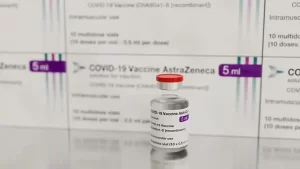How Do Proteins Drive Cancer Growth?
- Global First: Bovine Avian Influenza Transmission to Humans Detected
- Potassium-Enriched Salt Substitutes: Reducing Blood Pressure Risk?
- Tritium Detection in Fukushima’s Seawater: Below Safety Standards
- What Reason Let AstraZeneca Withdraws COVID Vaccine From The Market?
- How Many Times Can a Cancer Patient Undergo Chemotherapy?
- What are the WHO recommendations for Japanese encephalitis vaccines?
How Do Proteins Drive Cancer Growth?
- AstraZeneca Admits for the First Time that its COVID Vaccine Has Blood Clot Side Effects
- Was COVID virus leaked from the Chinese WIV lab?
- HIV Cure Research: New Study Links Viral DNA Levels to Spontaneous Control
- FDA has mandated a top-level black box warning for all marketed CAR-T therapies
- Can people with high blood pressure eat peanuts?
- What is the difference between dopamine and dobutamine?
- How long can the patient live after heart stent surgery?
How Do Proteins Drive Cancer Growth?
Researchers have delved into the proteins involved in various cancerous tumors, uncovering insights that genome sequencing alone cannot provide.
By deciphering the behavior of proteins within cancer cells, it becomes possible to develop therapeutic methods that target key proteins driving cancer progression or trigger immune responses against abnormal proteins produced by cancer cells.
Led by institutions including the Washington University School of Medicine in St. Louis, Massachusetts Institute of Technology, Broad Institute of MIT and Harvard, Brigham Young University, and other global organizations, the Clinical Proteomic Tumor Analysis Consortium investigated critical cancer-driving proteins and their regulatory mechanisms.
The findings were published in a series of papers on August 14th in the journals “Cell” and “Cancer Cell.”

The Clinical Proteomic Tumor Analysis Consortium is funded by the National Cancer Institute, part of the National Institutes of Health (NIH).
Dr. Li Ding, Senior Author and Professor at Washington University School of Medicine, stated, “In our efforts to develop better cancer therapies, this new analysis of proteins driving tumor growth is the next step after cancer genome sequencing. From past work sequencing the genomes of cancer cells, we identified nearly 300 genes that drive cancer. Now, we are studying the machinery these cancer genes set in motion—proteins and their regulatory networks that actually cause uncontrolled cell division. We hope this analysis will be a valuable resource for cancer researchers developing new therapies for various types of tumors.”
Researchers analyzed approximately 10,000 proteins across ten different types of cancers, emphasizing the significance of large-scale data in such analyses. Many crucial cancer-driving proteins are rare within any one type of cancer, making their discovery unlikely through isolated studies of individual tumor types. This analysis covered two different types of lung cancer, as well as colorectal, ovarian, kidney, head and neck, uterine, pancreatic, breast, and brain cancers.
Dr. Ding, also a researcher at Barnes-Jewish Hospital and the Siteman Cancer Center at Washington University School of Medicine, explained, “When we do a comprehensive analysis across multiple cancer types, we increase our ability to detect critical proteins that drive cancer growth and spread. Comprehensive analysis also allows us to identify major common mechanisms driving different types of cancers.”
Beyond individual protein functions, these data allow researchers to understand how proteins interact to promote cancer growth. If the levels of two proteins are correlated—when higher levels of one protein always coincide with higher levels of another—it indicates these proteins are acting in partnership. Disrupting such interactions could be an effective strategy to halt tumor growth.
These studies, including research co-led by Dr. Gad Getz of the Broad Institute, also revealed various methods of altering protein functionality through chemical changes.
The researchers documented how these chemical changes, called acetylation and phosphorylation processes, alter DNA repair, immune response, DNA folding and packaging, and other critical molecular changes that might contribute to cancer development.
The research also shed light on the effectiveness of immunotherapies. Immune checkpoint inhibitors and similar therapies are often most effective against highly mutated cancers, yet not all patients respond, even in those with a high mutation load.
The researchers found that a high mutation rate doesn’t always correlate with a high presence of abnormal proteins, which are the targets of the immune system’s attack against tumors.
Dr. Ding stated, “For some cancers, even if a mutation could create a tumor antigen, if there is little or no expression of abnormal proteins, that mutation may not be a target for treatment. This could explain why some patients don’t respond to immunotherapies, even when they seem like they should. So, our proteomic investigation covers the spectrum of tumor antigen expression, particularly useful for designing new immune therapies targeting specific mutations.”
In another study, Dr. Ding’s team identified DNA methylation patterns, another form of chemical change that can influence gene expression.
These patterns could be pivotal drivers of cancer. In a significant discovery, the research team identified molecular switches that suppress the immune system in certain types of tumors.
The final paper in this set of four studies provides the broader research community with the data and analytical resources used by the consortium.
She concluded, “Overall, this comprehensive proteomic and chemical modification analysis across multiple cancer types—combined with our long-standing knowledge from cancer genomics—provides an additional layer of information. We hope this information will help address many enduring questions about how cancer grows and evades many of our best therapies.”
How Do Proteins Drive Cancer Growth?
(source:internet, reference only)
Disclaimer of medicaltrend.org
Important Note: The information provided is for informational purposes only and should not be considered as medical advice.



